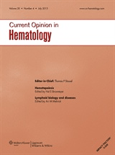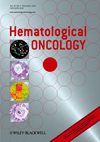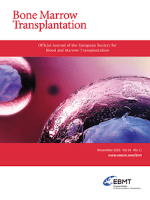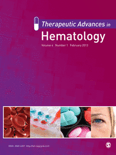
CURRENT OPINION IN HEMATOLOGY
Scope & Guideline
Connecting groundbreaking research to clinical practice.
Introduction
Aims and Scopes
- Hematopoiesis and Stem Cell Biology:
The journal emphasizes research on hematopoiesis, including the regulation of hematopoietic stem cells, their differentiation pathways, and the impact of genetic and environmental factors on their function. - Coagulation and Hemostasis:
A significant focus is placed on the mechanisms of coagulation, platelet biology, and the role of various proteins and pathways in hemostasis and thrombosis. This includes insights into novel therapeutic targets and the implications for clinical practice. - Hematological Malignancies:
The journal covers the pathophysiology, diagnosis, and treatment of hematological malignancies such as leukemia and lymphoma, with a particular emphasis on emerging therapies and genetic findings that inform treatment strategies. - Transfusion Medicine and Cellular Therapies:
Research related to transfusion practices, the effects of transfusions on recipient health, and advances in cellular therapies, including stem cell transplantation and gene therapy, is a core area of interest. - Inflammation and Immune Responses:
The intersection of inflammation, immune responses, and hematological disorders is explored, particularly how these interactions inform disease mechanisms and treatment approaches. - Novel Diagnostic and Therapeutic Approaches:
The journal highlights advancements in diagnostic technologies and therapeutic interventions, including precision medicine approaches and the use of novel biomarkers in the management of hematological conditions.
Trending and Emerging
- Gene Therapy and Genetic Modifications:
There is a growing focus on gene therapy approaches for treating hematological disorders, including sickle cell disease and hemophilia. This trend underscores the potential of genetic modifications to provide long-term solutions to previously intractable conditions. - Microbiome and Immune Interactions:
Research exploring the role of the microbiome in hematological health and disease is emerging as a significant area of interest, particularly in understanding how these interactions influence immune responses and disease outcomes. - Precision Medicine in Hematology:
The application of precision medicine principles, including the use of biomarkers to tailor therapies for individual patients, is increasingly emphasized. This approach aims to enhance treatment efficacy and minimize adverse effects. - Platelet and Coagulation Research:
Innovations in understanding platelet biology and coagulation pathways, particularly in the context of inflammatory diseases and cancer, are becoming more prominent, highlighting the complex interplay between these systems. - Impact of Inflammation on Hematopoiesis:
Emerging studies are focusing on how inflammatory processes affect hematopoiesis and contribute to hematological disorders, revealing insights into disease mechanisms and potential therapeutic targets. - Single-Cell Genomics and Advanced Imaging Techniques:
The integration of single-cell genomics and advanced imaging technologies is providing new avenues for understanding hematopoietic processes and cellular interactions at unprecedented resolution, paving the way for novel discoveries.
Declining or Waning
- Traditional Hematology Techniques:
There appears to be a waning interest in traditional hematological techniques that do not integrate modern technologies or novel insights. As research advances, there is a greater emphasis on cutting-edge methodologies rather than conventional practices. - Basic Descriptive Studies:
Studies that primarily provide descriptive data without a strong hypothesis or innovative approach are becoming less common. The journal seems to favor papers that offer new insights or applications rather than those that simply report findings. - General Reviews Without Novel Insights:
General reviews that do not contribute new perspectives or synthesize current knowledge in a meaningful way are being published less frequently. The focus has shifted toward more analytical and critical reviews that engage with recent advancements. - Basic Research on Non-Hematological Conditions:
Research that only tangentially relates to hematology, particularly studies focused on other fields without a clear connection to hematological implications, is declining in prominence within the journal.
Similar Journals

EXPERIMENTAL HEMATOLOGY
Empowering Discoveries in Blood and Cellular BiologyEXPERIMENTAL HEMATOLOGY, published by Elsevier Science Inc, is a leading journal in the field of hematology, distinguished by its impactful contributions to the study of blood-related disorders and cellular biology. With an ISSN of 0301-472X and an E-ISSN of 1873-2399, this journal has established a significant presence since its inception in 1973, continuing to be relevant through 2024. It holds a commendable Q1 ranking in Hematology and Q2 in various significant categories including Cancer Research, Cell Biology, Genetics, and Molecular Biology, recognizing its quality and influence in the scientific community. Researchers and professionals can access a wide range of meticulously peer-reviewed articles that promote cutting-edge research and foster collaboration across disciplines. As a vital platform for disseminating innovative findings, EXPERIMENTAL HEMATOLOGY empowers its audience to delve deeper into the complexities of hematological research and brings to light the advances critical for improving patient outcomes.

HEMATOLOGICAL ONCOLOGY
Illuminating Innovations in Hematological MalignanciesHEMATOLOGICAL ONCOLOGY, published by Wiley, is a premier journal in the fields of cancer research, hematology, and oncology, with a rich history of publication dating back to 1983. With an impact factor indicative of its influential standing—ranking in the second quartile in multiple categories including Cancer Research, Hematology, and Oncology—this journal serves as a vital resource for researchers, clinicians, and students alike. HEMATOLOGICAL ONCOLOGY is based in the United Kingdom and focuses on the advancements and challenges in the understanding and treatment of hematological malignancies. While it does not offer open access options, its rigorous peer-review process ensures that all published articles are of the highest quality, contributing to the ongoing dialogue and research in this critical area of medicine. With its commitment to disseminating impactful research, HEMATOLOGICAL ONCOLOGY remains an essential platform for driving innovation and collaboration within the global scientific community.

Hematologie
Driving Clinical Practice with Cutting-Edge ResearchHematologie is a highly regarded journal in the field of hematology, published by JOHN LIBBEY EUROTEXT LTD. With an ISSN of 1264-7527 and an E-ISSN of 1950-6368, this journal has established itself as a vital resource for researchers, clinicians, and students dedicated to advancing the understanding of blood disorders and treatments. Although the journal's coverage in Scopus was discontinued in 2018, it has continually provided invaluable insights and research findings. The journal aims to foster knowledge sharing and discussion in hematology, exploring innovative methodologies and emerging trends in the field. With a commitment to quality research, Hematologie remains an essential platform for disseminating critical findings that can drive clinical practice and influence future studies in hematological sciences.

INTERNATIONAL JOURNAL OF HEMATOLOGY
Connecting Scholars in the Pursuit of Blood KnowledgeThe INTERNATIONAL JOURNAL OF HEMATOLOGY, published by SPRINGER JAPAN KK, serves as a critical platform for advancing research in the field of hematology. With a prestigious history spanning over three decades from 1991 to 2024, this journal is recognized for its impactful contributions, evidenced by its Q2 category ranking in Hematology for 2023, and its notable position at rank #71 out of 137 in the Scopus Medicine Hematology category. Researchers and professionals within the hematology community benefit from the journal's rigorous peer-reviewed articles that cover a wide range of topics, including clinical studies, basic research, and novel therapeutic strategies. Though currently non-open access, it provides essential insights and findings to an audience passionate about the latest advancements in blood disorders and treatments. Situated in Japan, the journal not only showcases high-quality research but also fosters a global exchange of knowledge in hematology, making it a significant resource for scholars, practitioners, and students alike.

UHOD-Uluslararasi Hematoloji-Onkoloji Dergisi
Empowering researchers with pivotal findings.UHOD-Uluslararasi Hematoloji-Onkoloji Dergisi, published by AKAD DOKTORLAR YAYINEVI, is a pivotal journal in the fields of hematology and oncology, catering to an international audience of researchers, clinicians, and students. Since its inception in 2005, the journal has committed to disseminating high-quality, peer-reviewed research, highlighting advancements and challenges in the diagnosis and treatment of hematological and oncological disorders. Registered under ISSN 1306-133X, it serves as a significant platform for scholarly discourse, despite its recent categorization in the Q4 quartile for both hematology and oncology—indicating opportunities for growth and contribution within the scientific community. While currently not Open Access, the journal's indexed contribution to Scopus ranks it within the 12th and 17th percentiles in the domains of hematology and oncology respectively, reflecting its emerging presence within the academic landscape. As it approaches its convergence point in 2024, UHOD strives to elevate its influence, providing invaluable insights and fostering collaborations in the ongoing fight against blood disorders and cancer.

BONE MARROW TRANSPLANTATION
Empowering the Future of Bone Marrow Medicine.BONE MARROW TRANSPLANTATION, published by SpringerNature, stands as a leading journal in the fields of Hematology and Transplantation, as evidenced by its recognition in the Q1 category for both disciplines according to 2023 rankings. With an impressive impact factor and notable Scopus rankings—7th out of 54 in Medicine Transplantation and 25th out of 137 in Medicine Hematology—this journal is instrumental for researchers and professionals dedicated to advancements in bone marrow transplantation practices and research. Established in 1986, the journal publishes original research, clinical studies, and reviews that push the boundaries of current knowledge, making it essential reading for those looking to stay abreast of the latest developments in the field. Although offering limited Open Access options, BONE MARROW TRANSPLANTATION reaches a broad audience and furthers a global dialogue on best practices and innovative approaches in transplantation medicine. Its address in London, UK positions it at the heart of international research collaboration, fostering connections among scientists, clinicians, and students alike.

Journal of Hematology
Connecting Scholars, Enhancing PracticeThe Journal of Hematology, published by ELMER PRESS INC, serves as a pivotal platform for disseminating cutting-edge research in the field of hematology. With an ISSN of 1927-1212 and an E-ISSN of 1927-1220, this journal is committed to advancing scientific knowledge and clinical practice through high-quality peer-reviewed articles encompassing all aspects of blood disorders, from basic science to health policy implications. While the journal currently operates under a traditional access model, it nonetheless prioritizes the rapid publication of significant findings, ensuring that researchers, clinicians, and students have timely access to the latest advancements in hematological research. Positioned to bridge gaps in knowledge and foster collaboration among scholars worldwide, the Journal of Hematology is an essential resource for anyone invested in this vital area of medicine.

ACTA HAEMATOLOGICA
Pioneering Insights into Hematological PracticesACTA HAEMATOLOGICA, published by KARGER, is a prestigious journal established in 1948, dedicated to the field of hematology and related medical sciences. With an ISSN of 0001-5792 and an E-ISSN of 1421-9662, this journal stands out with a Q2 ranking in both Hematology and Miscellaneous Medicine categories as of 2023. Researchers and professionals can benefit from its high-quality peer-reviewed articles, contributing to a more profound understanding and advancement of hematological practices. Although it does not offer open access options, ACTA HAEMATOLOGICA remains an essential resource for researchers in Switzerland and worldwide, providing critical insights and fostering discourse among academic and clinical communities. The journal's address is located in the heart of Basel, Switzerland, ensuring its robust connection to European medical research networks. With a firm commitment to excellence, this publication plays a vital role in disseminating knowledge, guiding future innovations in the field.

BLOOD REVIEWS
Elevating knowledge in blood disorders and cancer care.BLOOD REVIEWS is a highly regarded journal published by Churchill Livingstone, specializing in the fields of Hematology and Oncology. With an impressive Q1 ranking in both disciplines and placing in the top 10% of its peer categories according to Scopus metrics, it provides an essential platform for the dissemination of cutting-edge research and reviews pertaining to blood disorders and cancer treatment. Since its inception in 1987 and continuing through 2024, the journal has established itself as a cornerstone for healthcare professionals, researchers, and students who seek to advance their understanding of hematologic and oncologic topics. While not an open-access journal, BLOOD REVIEWS retains a reputation for delivering high-quality, peer-reviewed articles that foster dialogue and innovation within the scientific community. For those in the United States and beyond, the journal serves as a vital resource, housed at the Journal Production Department in Edinburgh, Scotland, ensuring accessibility and a global reach in its critical academic contributions.

Therapeutic Advances in Hematology
Pioneering breakthroughs in blood health.Therapeutic Advances in Hematology is a prestigious, peer-reviewed journal dedicated to advancing the field of hematology through innovative research and clinical studies. Published by SAGE Publications Ltd, this journal has become a vital resource for hematology professionals and researchers since its inception in 2010. With its impactful Q1 ranking in Hematology and a Scopus rank of 62 out of 137, it firmly establishes itself as a leader in disseminating significant findings and therapeutic approaches. The journal has been committed to open access since 2019, ensuring that its cutting-edge research is readily available to the global scientific community. Covering a broad scope of topics within hematology, Therapeutic Advances in Hematology is an essential platform for those seeking to enhance their understanding and implementation of therapeutic practices in hematological conditions. The journal embraces submissions from both clinical and laboratory perspectives, fostering collaboration and dialogue among researchers, clinicians, and students alike.